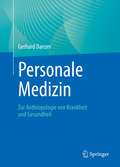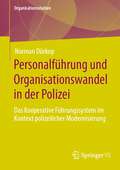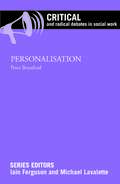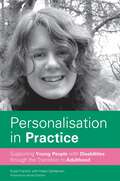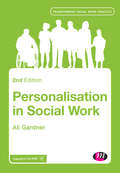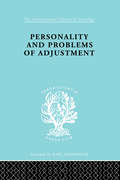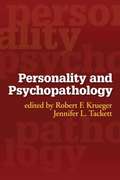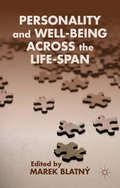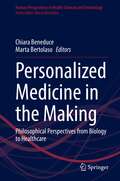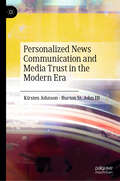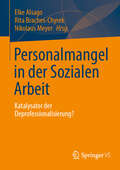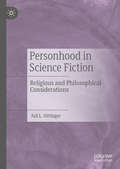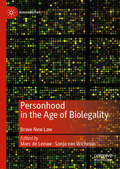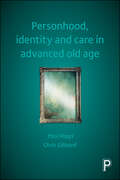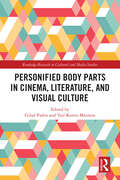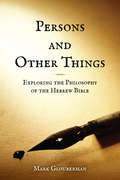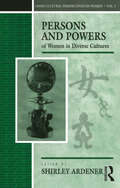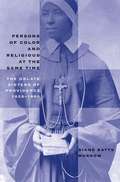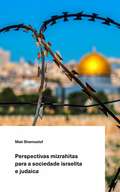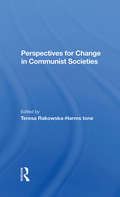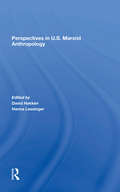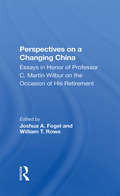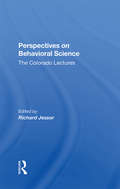- Table View
- List View
Personale Medizin: Zur Anthropologie von Krankheit und Gesundheit
by Gerhard DanzerDer Begriff und die Inhalte der "Personalen Medizin" haben sich in den letzten Jahre etabliert. Patient*innen und Ärzt*innen verstehen darunter eine Heilkunde für Personen von Personen. In den letzten zehn Jahren haben sich die Konzepte der Personalen Medizin - ähnlich wie die gesamte Schulmedizin - weiterentwickelt. Dieses Buch befasst sich mit der Anthropologie von Gesundheit und Krankheit, mit Ärzten und Patienten und deren Beziehung, also auch ganz praktisch mit den biomedizinisch-morphologischen und psychosozial-funktionellen Störungen.
Personalentwicklung an Gymnasien und Gemeinschaftsschulen mit Oberstufe in Schleswig-Holstein: Eine empirische Untersuchung aus der Perspektive von Mitgliedern der erweiterten Schulleitungen
by Dr. Björn FaupelDas Buch zeigt den Status quo im Bereich der schulischen Personalentwicklung an Gymnasien und Gemeinschaftsschulen mit Oberstufe durch Schulleitungsmitglieder auf. Neben theoretischen Grundlagen, die sich mit der Personalentwicklung im Kontext, mit Aufgaben und Zielen, Instrumenten, Maßnahmen, Strategien, Führung, Kompetenzprofilen, Prozessen sowie dem Ressourcenmanagement und Forschungsstand beschäftigen, wird die empirische Studie bezüglich Explikationen, Vorüberlegungen sowie Überlegungen zum Fragebogen ausgeführt. Der Status quo für Personalentwicklung wird für Schleswig-Holstein herausgestellt und Einschränkungen werden mit Handlungsschwerpunkten, die ein ganzheitliches Selbstverständnis fordern – mit einer kooperativen Führung und der Schulleitung als Team, dargelegt. Neben diesen sind Beratungsgespräche der Schulleitung, schulinterne Weiterbildung und offene Gesprächsangebote bei der Verknüpfung der theoretischen und praktischen Aspekte unter Berücksichtigung des Gesundheitsmanagements zu präferieren, um die Verzahnung von schulischen, individuellen und gesellschaftlichen Zielen zu ermöglichen sowie fehlende Kenntnisse im Bereich der Personalentwicklung zu kompensieren. Wie das schulisch umgesetzt ist, erfahren Sie in diesem Buch.
Personalführung und Organisationswandel in der Polizei: Das Kooperative Führungssystem im Kontext polizeilicher Modernisierung (Organisationsstudien)
by Norman DürkopDas „Kooperative Führungssystem“ (KFS) gilt seit 40 Jahren als die offizielle Führungskonzeption der bundesdeutschen Polizei, wurde aber trotz dieser Bedeutung von der sozialwissenschaftlichen Forschung bisher nur am Rande zur Kenntnis genommen. Die Arbeit macht den Versuch, das KFS als Bestandteil eines längerfristigen Führungswandels in der Polizei während der 1960er und 1970er Jahre zu beschreiben und seine heutige Funktion für die Polizei zu bestimmen. Trotz der Verankerung in diversen bundesweit gültigen Vorschriften zeigt sich, dass das KFS heutzutage meist auf den Wert des kooperativen Führens reduziert wird. Die Relevanz des KFS für die Polizei ist somit weniger in der Formalstruktur als vielmehr in der Schauseite zu sehen: Mit dem KFS kann die Polizei ihre Orientierung an den Bürgerrechten für das Publikum wirkungsvoll inszenieren.
Personalisation (Critical and Radical Debates in Social Work)
by Peter BeresfordPersonalisation has become the policy buzz-word of the twenty-first century. Supporters claim it offers service users choice and services attuned to meet their specific needs, moving away from 'one size fits all' state services. In this short form book, part of the Critical and Radical Debates in Social Work series, Peter Beresford, one of Britain's foremost social work academics, challenges the personalisation agenda and its consequences on service users. Although critical of 'one size fits all' services that deny service user voice, Beresford argues that personalisation turns service users into 'consumers' of services within a care market and hence reinforces the commodification of care which sees vast profits made by a small number of providers at the expense of good quality services for those who use them.
Personalisation in Practice: Supporting Young People with Disabilities through the Transition to Adulthood
by Helen Sanderson Nicola Gitsham Suzie FranklinThis book demonstrates very clearly how the personalisation of support and services works in practice. The authors describe how Jennie, a young person with autism and learning difficulties, was supported through the transition from school to living independently using simple, evidence-based person-centred planning tools. Jennie's story illustrates the importance of quality person-centred reviews, dispels the many myths surrounding Individual Service Funds and personal budgets and demonstrates how families, schools and other agencies can work collaboratively to help young people with disabilities move into adulthood with more choice and control over their lives, and with better life prospects. Practical pointers for readers to apply to their own circumstances are included, and the book contains helpful examples of the key person-centred thinking tools. Anyone involved in supporting children and young people with disabilities as they approach adulthood, including parents and carers, SENCOs, teachers, social workers and service providers, will find this to be essential reading. More generally, it will be an informative resource for those seeking a better understanding of how personalisation and person-centred planning work in practice.
Personalisation in Social Work
by Ali GardnerThe text provides an overview of the personalisation agenda and reflects on the legislation, history, theories, values and collective voices that have influenced this agenda. Opportunities are also provided for students to consider the changes to the social work role, and to evaluate the impact of this for service users and as practitioners. By offering practical support to social work students and practice educators, this text provides a clear understanding of competent practice within a personalisation context and aims to encourage students to explore the major tensions, dilemmas and themes emerging within this agenda.
Personalisation in Social Work (Transforming Social Work Practice Series)
by Ali GardnerThe government agenda on Personalisation and self-directed support is fast-moving and rapidly changing. It is vital therefore that students and practitioners alike are aware of the key issues and debates, as well as the policy that surrounds this area of practice. This timely and fully revised second edition provides an overview of the personalisation agenda and looks at the recent legislation in a broad historical and theoretical perspective. This approach will provide opportunities for students to consider the changes to the social work role and to evaluate the impact of this for service users and as practitioners.
Personality and Problems of Adjustment (International Library of Sociology)
by Kimbell YoungFirst Published in 1998. Routledge is an imprint of Taylor & Francis, an informa company.
Personality and Psychopathology
by Jennifer L. Tackett Robert F. KruegerTraditionally, personality and psychopathology have been distinct areas of inquiry. This important volume reviews influential research programs that increasingly bridge the gap between the two areas. Presented are compelling perspectives on whether certain personality traits or structures confer risks for mental illness, how temperament interacts with other influences on psychological adaptation, links between personality disorders and mood and anxiety disorders, implications for effective intervention, and more.
Personality and Well-being Across the Life-Span
by Marek BlatnýBoth an individual's personality and well-being are important throughout their lives. This book explores the current research on links between personality predictors of well-being and social adjustment using empirical studies to suggest that their influence can vary depending on the key developmental stage.
Personalized Medicine in the Making: Philosophical Perspectives from Biology to Healthcare (Human Perspectives in Health Sciences and Technology #3)
by Marta Bertolaso Chiara BeneduceThis book offers a multidisciplinary look at the much-debated concept of “personalized medicine”. By combining a humanistic and a scientific approach, the book builds up a multidimensional way to understand the limits and potentialities of a personalized approach in medicine and healthcare. The book reflects on personalized medicine and complex diseases, the relationship between personalized medicine and the new bio-technologies, personalized medicine and personalized nutrition, and on some ethical, political, economic, and social implications of personalized medicine. This volume is of interest to researchers from several disciplines including philosophy, bio-medicine, and the social sciences.
Personalized News Communication and Media Trust in the Modern Era
by Kirsten Johnson Burton St. John IIIThis book examines the role of media credibility and trust in news personalization and consumer engagement in the US. While much has been written about the use of algorithms in audience targeting, we define news personalization in a different way: as attempts by news personnel to build credibility and trust with consumers through a focus on relatable news. The book examines tactics such as the use of transparency cues in stories, responsiveness to audience comments, and disclosing personal information to consumers. It also addresses the challenges of news personalization, including how messaging from vested interests may also be seen by audiences as personalized news. In an age when individuals are increasingly determining their own ecology of news sources, this book offers a unique perspective on an emerging area of news customization and personalization.
Personalmangel in der Sozialen Arbeit: Katalysator der Deprofessionalisierung?
by Rita Braches-Chyrek Elke Alsago Nikolaus MeyerDer Personalmangel in der Sozialen Arbeit gefährdet zunehmend nicht nur die Qualität sozialer Dienstleistungen, sondern verändert auch das professionelle Selbstverständnis und die strukturelle Verankerung des Berufs. Dieses Buch zeigt: Der Mangel an qualifiziertem Personal ist kein temporäres Phänomen, sondern Ausdruck tiefgreifender Veränderungen – in Ausbildung, Arbeitsbedingungen und gesellschaftlicher Anerkennung. Anhand empirischer Befunde und differenzierter Analysen beleuchten die Autor:innen die Situation in zentralen Arbeitsfeldern wie der Elementarbildung, der Kinder- und Jugendhilfe, der Sozialen Arbeit bei Behinderung und der Wohnungslosenhilfe. Auch die Perspektiven von Adressat:innen und professionspolitischen Akteur:innen werden einbezogen. Das Buch verdeutlicht eindrücklich, wie aus isolierten Personalengpässen ein gesamtgesellschaftliches Risiko erwächst – und welche strukturellen Antworten jetzt notwendig sind. Ein grundlegender Beitrag zur aktuellen Fachkräftedebatte und zur Zukunft Sozialer Arbeit. Die Herausgeber:innen Dr. Elke Alsago ist Leiterin der ver.di-Bundesfachgruppe für Erziehung, Bildung und Soziale Arbeit, Sozialarbeiterin und Diakonin. Dr. Rita Braches-Chyrek ist Universitätsprofessorin für Sozialpädagogik der Otto-Friedrich-Universität Bamberg. Dr. Nikolaus Meyer ist Professor für Profession und Professionalisierung Sozialer Arbeit an der Hochschule Fulda.
Personhood in Science Fiction: Religious and Philosophical Considerations
by Juli L. GittingerThis book addresses the topic of personhood—who is a “person” or “human,” and what rights or dignities does that include—as it has been addressed through the lens of science fiction. Chapters include discussions of consciousness and the soul, artificial intelligence, dehumanization and othering, and free will. Classic and modern sci-fi texts are engaged, as well as film and television. This book argues that science fiction allows us to examine the profound question of personhood through its speculative and imaginative nature, highlighting issues that are already visible in our present world.
Personhood in the Age of Biolegality: Brave New Law (Biolegalities)
by Marc De Leeuw Sonja Van WichelenThis volume showcases emerging interdisciplinary scholarship that captures the complex ways in which biological knowledge is testing the nature and structure of legal personhood. Key questions include: What do the new biosciences do to our social, cultural, and legal conceptions of personhood? How does our legal apparatus incorporate new legitimations from the emerging biosciences into its knowledge system? And what kind of ethical, socio-political, and scientific consequences are attached to the establishment of such new legalities? The book examines these problems by looking at materialities, the posthuman, and the relational in the (un)making of legalities. Themes and topics include postgenomic research, gene editing, neuroscience, epigenetics, precision medicine, regenerative medicine, reproductive technologies, border technologies, and theoretical debates in legal theory on the relationship between persons, property, and rights.
Personhood, Identity and Care in Advanced Old Age
by Paul Higgs Chris GilleardHow do we sustain agency and identity amidst the frailty of advanced old age? What role does care play in this process? Pushing forward new sociological theory, this book explores the theoretical and practical issues raised by age and infirmity. It begins with a theoretical examination of the fourth age, interrogating notions of agency, identity and personhood, as well as the impact of frailty, abjection and ‘othering’. It then applies this analysis to issues of care. Exploring our collective hopes and fears concerning old age and the ends of people’s lives, this is essential reading on one of the biggest social issues of our time.
Personified Body Parts in Cinema, Literature, and Visual Culture (Routledge Research in Cultural and Media Studies)
by Gilad Padva Yair Koren-MaimonPersonified Body Parts in Cinema, Literature, and Visual Culture investigates the power of personifying body parts in cinema, television, visual culture, literature, erotica, folklore, and mystique.Culturally, socially, and poetically exposing hidden aspects and subtleties of human existentialism, this book vigorously questions and problematizes numerous artistic, aesthetic, technological, naïve, and macabre manipulations of body parts for various purposes. A diverse team of authors explore how scribing human traits to limbs, eyes, brains, genitalia, hearts, and other inner organs is grotesque and aesthetic, repealing and appealing, intimidating and intimate, rude and enjoyable, material and spiritual, surprising and mundane. Personified organs are interrelated with bodily integrity, visceral aesthetics, distorted nature, social anxiety and acceptability, cultural classifications and hierarchies, and dissident innovativeness andradicalism.This interdisciplinary volume involves body studies; cinema, television, and media studies; literature studies; cultural, intercultural, and countercultural studies; mythology and folklore studies; gender, sexuality, trans and queer studies; ethnicities and postcolonialism; and art history.
Persons and Other Things: Exploring the Philosophy of the Hebrew Bible
by Mark GloubermanThe Hebrew Bible is a philosophical testament. Abraham, the first biblical philosopher, calls out to the world in God’s name exactly as Plato calls out in the name of the Forms. Abraham comes forward as a critic of pagan thought about, specifically, persons. Moses, to whom the baton is passed, spells out the practical implications of the Bible’s core anthropological teachings. In Persons and Other Things Mark Glouberman explores the Bible’s philosophy, roughing out in the course of a defence of it how men and women who see themselves in the biblical portrayal (as he argues that most of us do once the "religious" glare is reduced) are committed to conduct their personal affairs, arrange their social ties, and act in the natural world. Persons and Other Things is also the author’s testament about the practice of philosophy. Glouberman sets out the lessons he has acquired as a lifelong learner about thinking philosophically, about writing philosophy, and about philosophers.
Persons and Powers of Women in Diverse Cultures (Cross-Cultural Perspectives on Women)
by Shirley ArdenerThis volume presents important essays inspired by the pioneering works of three leading women anthropologists. The title may therefore be read in more than one way. The three biographical essays in this volume as well as the comprehensive bibliographies of these anthropologists' works fully confirm the high esteem in which their remarkable personalities are held to this day and offer material about them not formerly available. The book includes important discussions by distinguished social anthropologists, based on rich ethnographic data, of the many identities, personhoods, powers, and other various categorizations of women, each author handling her material and analyses in her own distinctive way. Of particular value is Shirley Ardener's perceptive introductory essay which places the volume in the wider context of some areas of major concern to social scientists, such as the construction of identities, kinship theory, and the production of knowledge itself, as well as of the particularities of women in diverse cultures.
Persons of Color and Religious at the Same Time
by Diane Batts MorrowFounded in Baltimore in 1828 by a French Sulpician priest and a mulatto Caribbean immigrant, the Oblate Sisters of Providence formed the first permanent African American Roman Catholic sisterhood in the United States. It still exists today. Exploring the antebellum history of this pioneering sisterhood, Diane Batts Morrow demonstrates the centrality of race in the Oblate experience.By their very existence, the Oblate Sisters challenged prevailing social, political, and cultural attitudes on many levels. White society viewed women of color as lacking in moral standing and sexual virtue; at the same time, the sisters' vows of celibacy flew in the face of conventional female roles as wives and mothers. But the Oblate Sisters' religious commitment proved both liberating and empowering, says Morrow. They inculcated into their communal consciousness positive senses of themselves as black women and as women religious. Strengthened by their spiritual fervor, the sisters defied the inferior social status white society ascribed to them and the ambivalence the Catholic Church demonstrated toward them. They successfully persevered in dedicating themselves to spiritual practice in the Roman Catholic tradition and their mission to educate black children during the era of slavery.
Perspectivas mizrahitas para a sociedade israelita e judaica.
by Mati ShemoelofArtstas e autores israelitas estão começando a criar uma cultura hebriaca alternativa que desafia normas e frontiras nacionais.
Perspectives For Change In Communist Societies
by Theresa Rakowska-harmstone Teresa Rakowska-HarmstoneTo what degree has political, social, and economic change been stimulated by the impact of the past and present policies of Communist political systems? Perhaps more important, to what extent has the momentum for change, stimulated by past policies, been frustrated by the nature of these systems? This volume, an interdisciplinary and international work based on a symposium presented at the October 1976 Annual Conference of the American Association for the Advancement of Slavic Studies, addresses these questions. The contributors collectively assess the extent of change generated by the policies of social mobilization as they are channeled and contained within the Communist political systems. Clearly and perceptively, they analyze selected aspects of change—or its absence—in the political, social, and economic life of the Soviet Union and Eastern Europe.
Perspectives In U.s. Marxist Anthropology
by June Nash David J. Hakken Hanna Lessinger Florence BabbAn assessment of current trends in Marxist anthropology, thiscollection of essays reflects both the unifying force of Marxist thoughtand the diversity of contemporary anthropology. Linked by a commonapproach-a shared commitment to Marxist analysis-the contributorslook at a variety of phenomena, including the problems of labor andwork, in terms of a coherent theory of Marxism. Examining political,economic, and ethnic situations, the authors discuss social structures,ideology, and class formation. This unique volume warrants the attentionof both Marxists and non-Marxists in anthropology and ofscholars in other fields.
Perspectives On A Changing China: Essays In Honor Of Professor C. Martin Wilbur
by Joshua Fogel William T. RoweThis collection of essays represents current research in modern (post-1800) Chinese history. All contributors are former students of Professor C. Martin Wilbur, one of the great names in the China field over the past forty years, who recently retired from a long tenure as modern Chinese historian at Columbia University. While diverse in their subje
Perspectives On Behavioral Science: The Colorado Lectures
by Richard JessorThe behavioral sciences—anthropology, sociology, psychology, economics, geography, political science—have reached a turning point as we enter the decade of the 1990s. Freed from a strict emulation of classical science methodology, while benefiting from the remarkable advances in biology and the other "hard" sciences, scholars in the behavioral scie
